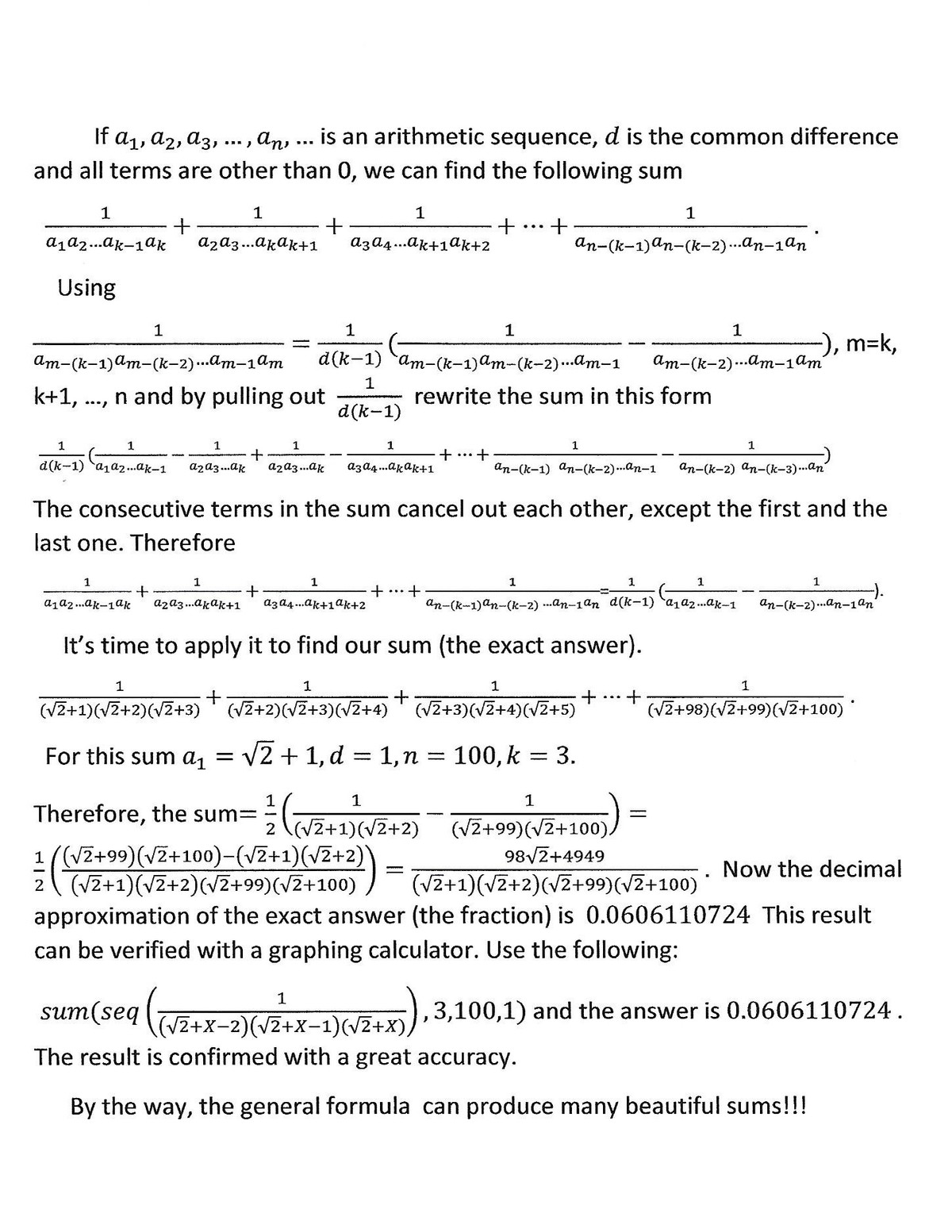Amazing sum
( 2 + 1 ) ( 2 + 2 ) ( 2 + 3 ) 1 + ( 2 + 2 ) ( 2 + 3 ) ( 2 + 4 ) 1 + ⋯ + ( 2 + 9 8 ) ( 2 + 9 9 ) ( 2 + 1 0 0 ) 1
Evaluate the sum above. Round the answer to four decimal places.
The answer is 0.0606.
This section requires Javascript.
You are seeing this because something didn't load right. We suggest you, (a) try
refreshing the page, (b) enabling javascript if it is disabled on your browser and,
finally, (c)
loading the
non-javascript version of this page
. We're sorry about the hassle.
3 solutions
Thank you for writing this beautiful solution. Mine was more general. E.G.
The general term in the sum is of the form
( x ) ( x + 1 ) ( x + 2 ) 1
which can be rewritten using partial fractions as
( 2 1 ⋅ x 1 ) − x + 1 1 + ( 2 1 ⋅ x + 2 1 )
Then the sum we're looking for can be rewritten as
[ ( 2 1 2 + 1 1 ) − 2 + 2 1 + ( 2 1 2 + 3 1 ) ] + [ ( 2 1 2 + 2 1 ) − 2 + 3 1 + ( 2 1 2 + 4 1 ) ] + [ ( 2 1 2 + 3 1 ) − 2 + 4 1 + ( 2 1 2 + 5 1 ) ] + [ ( 2 1 2 + 4 1 ) − 2 + 5 1 + ( 2 1 2 + 6 1 ) ] + . . . . + [ ( 2 1 2 + 9 5 1 ) − 2 + 9 6 1 + ( 2 1 2 + 9 7 1 ) ] + [ ( 2 1 2 + 9 6 1 ) − 2 + 9 7 1 + ( 2 1 2 + 9 8 1 ) ] + [ ( 2 1 2 + 9 7 1 ) − 2 + 9 8 1 + ( 2 1 2 + 9 9 1 ) ] + [ ( 2 1 2 + 9 8 1 ) − 2 + 9 9 1 + ( 2 1 2 + 1 0 0 1 ) ]
Note this is a form of a telescoping sum, and that all fractions except for three of the first four and three of the last four will cancel each other out. Thus our sum reduces to
2 1 ⋅ 2 + 1 1 − 2 + 2 1 + 2 1 ⋅ 2 + 2 1 + 2 1 ⋅ 2 + 9 9 1 − 2 + 9 9 1 + 2 1 ⋅ 2 + 1 0 0 1 = 2 1 ( 2 + 1 1 − 2 + 2 1 − 2 + 9 9 1 + 2 + 1 0 0 1 ) ≈ 0 . 0 6 0 6 1 1 0 7 2 4
Great solution. Thanks. E.G.

S = k = 2 ∑ 9 9 ( 2 + k − 1 ) ( 2 + k ) ( 2 + k + 1 ) 1 = 2 1 k = 2 ∑ 9 9 ( 2 + k − 1 1 − 2 + k 2 + 2 + k + 1 1 ) = 2 1 ( 2 + 1 1 − 2 + 9 9 1 − 2 + 2 1 + 2 + 1 0 0 1 ) ≈ 0 . 0 6 0 6